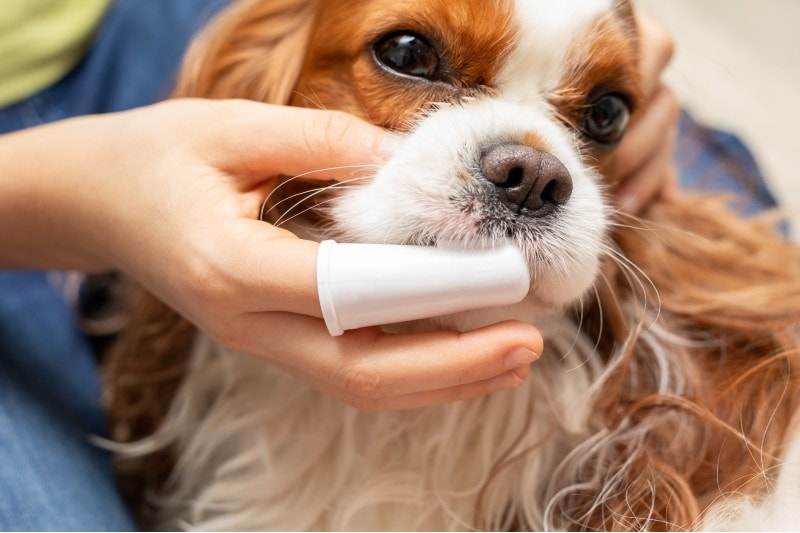How Long Do Cavalier King Charles Spaniels Live? Average Life Span, Data & Care
By Kit Copson
Updated on

Dogs come in all shapes and sizes with various personality types, looks, health conditions they’re susceptible to, and life expectancies. A dog’s expected lifespan depends on a range of factors, including living conditions, nutrition, genetics, and breed. While some breeds have relatively short average lifespans, others are estimated to live up to 15 years or even longer in some cases.
If you’re the proud parent of a Cavalier King Charles Spaniel, you’ll be pleased to know that this breed has a pretty decent life expectancy. According to most sources, the average lifespan of a Charles King Charles Spaniel is 12-15 years. Read on to find out how long Cavalier King Charles Spaniels live and the various factors that play a role in these dogs living life to the fullest.
What’s the Average Lifespan of a Cavalier King Charles Spaniel?
According to most sources, the Cavalier King Charles Spaniel has a life expectancy of between 12 and 15 years. That said, other sources estimate a 9–14-year lifespan for the breed.
Of course, this depends greatly on how well your Cavalier King Charles Spaniel is cared for and how healthy they are overall—if you’re considering getting a Cavalier, you should be aware that these dogs are prone to a number of health conditions—more on this below.
The Cavalier King Charles Spaniel has a long life expectancy compared with some other breeds. Dogs with shorter life expectancies include Saint Bernards (8–10 years), Great Danes (7–10 years), and brachycephalic breeds like French Bulldogs.1
Though French Bulldogs have an estimated life expectancy of 10–12 years according to the AKC, research has shown that Frenchies are the shortest-lived dog breed in the UK.2

The 3 Reasons Some Cavalier King Charles Spaniels Live Longer Than Others
Though there is no cast-iron method of knowing how long you’ll have with your sweet Cavalier, there are multiple factors that contribute to the length of a dog’s lifespan. Let’s explore some of these factors in more depth.
1. Susceptibility to Health Conditions
Despite having a long life expectancy, Cavalier King Charles Spaniels are prone to a number of health conditions—some of which may contribute to a shorter lifespan in some cases. Conditions Cavalier King Charles Spaniels are susceptible to include mitral valve heart disease, hip dysplasia, patella luxation, and syringomyelia.
Because of the Cavalier’s susceptibility to these conditions, it’s a good idea to keep up with routine vet check-ups at least once per year even if your dog seems healthy. It’s possible to get your Cavalier screened for health conditions even if they seem well. Otherwise, keep an eye on them for symptoms of health issues and contact your vet if something doesn’t seem quite right.

2. Nutrition
Proper nutrition is key when it comes to keeping your Cavalier healthy. Dogs need a diet containing animal protein, fats, carbohydrates, vitamins, minerals, and minerals in appropriate amounts. They also need access to plenty of fresh, clean water at all times.
We recommend looking for a high-quality, reputable brand that produces balanced, complete diets for dogs. In general, you should always go for the most high-quality brand you can afford. We also advise choosing low-calorie diets as a general rule and food with whole-food ingredients and ingredients you can recognize on the label.
The food you choose should also be suitable for your dog’s age and life stage. Some brands even manufacture food based on a dog’s size (e.g. mini, small dog, medium dog, etc.). If you’re unsure what kind of food would be best for your Cavalier, please ask your vet for advice.
3. Living Conditions
Your Cavalier King Charles Spaniel’s environment is another important factor to consider. To keep your canine companion as safe and healthy as possible, it’s crucial to dog-proof your home to keep it secure and free of any potential hazards.
This includes taking steps like placing toxic plants or substances out of your dog’s reach, putting up window guards in apartments, and making sure your home is free of dampness, mold, and drafts. Dogs need a warm and comfortable place to live and should never live outdoors.

The 4 Life Stages of a Cavalier King Charles Spaniel
1. Puppy
Dogs are considered puppies from birth up until they’re around 6–9 months old. Puppies typically leave their mothers when they are at least 8 weeks of age and will need more frequent vet visits than healthy adult dogs for routine procedures like vaccinations, spaying/neutering, and microchipping.

2. Young Adult
Dogs that have passed the 6–9-month mark are considered young adults up until the age of approximately 3–4 years.
3. Mature Adult
This stage lasts from when a dog is 3–4 years old up until they enter the last 25% of their life expectancy. This will vary by breed and other factors, but as a reference, a Cavalier King Charles Spaniel that lives to 12 years old would enter the last 25% of their life expectancy at age 9.

4. Senior
When a dog enters the last 25% of their estimated lifespan, they are considered to be a senior dog. You may notice some slowing down at this stage and your Cavalier King Charles Spaniel may not be as sprightly as they once were.
The 4 Ways to Tell Your Cavalier King Charles Spaniel’s Age
If you’re not sure of your Cavalier King Charles Spaniel’s age, your vet is the person who can give you the closest estimation. Vets take a few things into account when estimating a dog’s age, including:
1. Teeth Condition
A dog’s adult teeth typically come in when they’re around 6 months old, so before this point, it’s easier for vets to establish an approximate age.
The older a dog gets, the more likely they are to develop tartar and yellowing of the teeth, however, even some young dogs can experience tartar and yellowing, whereas well-cared-for teeth can still look pretty healthy even if a dog is an adult or senior. For this reason, once a dog has passed that 6-month mark, it’s harder for vets to estimate age based on the teeth.

2. Graying
Some dogs develop more gray hairs with age, though this can vary. In some cases, young dogs as little as 4 or 5 years old can start to go gray—Golden Retrievers in particular are known for this.
3. Eyes
Some older dogs’ eyes take on a gray-blue hazy or cloudy appearance. This is also a symptom of blindness in dogs, but sometimes, it’s simply a result of aging.

4. Body and Mind
Vets will also look out for how fit and mentally astute a dog is to get an idea of their age. While young dogs are more likely to be full of beans, senior dogs might be a little stiffer or less energetic. Some older dogs also suffer from confusion and disorientation.
 Conclusion
Conclusion
To recap, Cavalier King Charles Spaniels have an estimated lifespan of between 12 and 15 years, but they are also susceptible to several health conditions. Like all dogs, they require a safe, warm living environment, high-quality nutrition, constant access to clean water, and annual (at a minimum) routine vet checkups to make sure all is as it should be.
Featured Image Credit: Steshka Willems, Pexels











